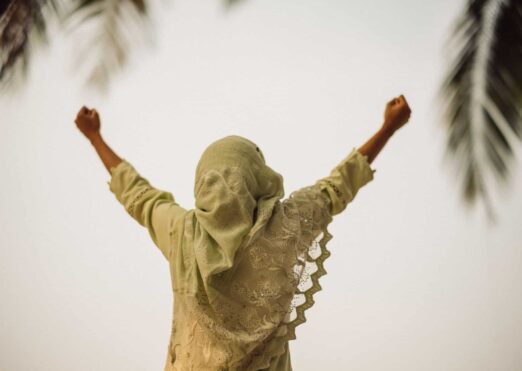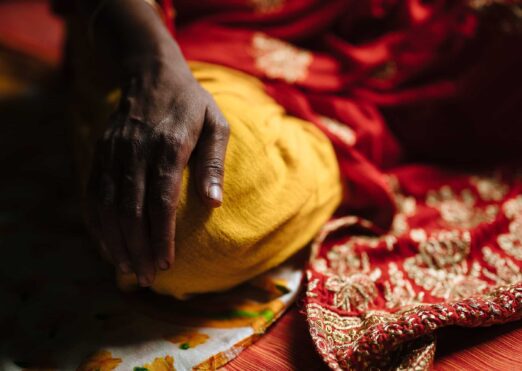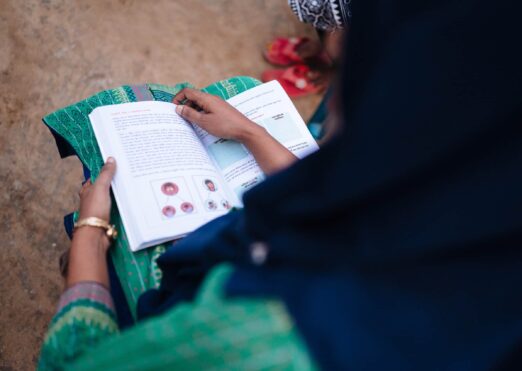Her Business: How a chicken shop is empowering survivors in Bangladesh
April 15, 2025
This Spring, donations* to Justice & Care will be doubled through our match-funding campaign – Her Future, which shines a light on the disproportionate impact of modern slavery on women and girls. Donate between April 16 and May 31 to double your impact and support survivors on their journey to freedom, justice and empowerment.
This Spring, every donation to Justice and Care will be doubled through our match-funding campaign – Her Future, which shines a light on the disproportionate impact of modern slavery on women and girls. Donate between April 16 and May 31 to double your impact and support survivors on their journey to freedom, justice and empowerment.
Nestled in an area of southern Bangladesh, lies a small fried chicken restaurant with a very special story behind it. For the five women who run the outlet, it has become a symbol of their resilience and empowerment following their time trapped in modern slavery.
‘With confidence and hard work, any difficult situation can be turned around. Today, I stand on my feet, make my own decisions, and support my family – this is the greatest achievement of my life,’ said Mahi**, one of the women working at the eatery.
Justice & Care has supported the women to open the business to provide a shining example of what reintegration and economic empowerment can look like for those impacted by issues like sexual exploitation and forced marriage.
Thanks to ingrained prejudices, women and girls who escape the grips of their traffickers and return home to Bangladesh are often not welcomed by their families and community, and instead judged and ostracised as they are no longer seen as ‘pure’.
Female survivors we have supported have found reintegration extremely challenging – with some banned from re-enrolling in school and other labelled ‘bad girls’ in their communities.
These attitudes are damaging to their mental health and limit employment opportunities – which can leave them more vulnerable to poverty and re-trafficking.
Justice & Care is supporting women and girls to address these issues by helping them by providing vocational training and support to open their own businesses, alongside other holistic care.
In 2022, we supported survivors to set up the JoyJatra Forum, which unites them to support each other, become advocates in their communities and input into Justice & Care’s programmes if they wish to. JoyJatra means ‘Journey to Victory’.
Since the very beginning, many women on the forum said they dreamt of opening a small restaurant that would not only provide them with an income but also employ other survivors of modern slavery, offering them the same benefits.
The Justice & Care team in Bangladesh supported them to make their dream a reality. The project took two years of planning, with training in food preparation, customer service and finance for the women involved key components in the journey.
In 2024, the securement of a partnership with a mainstream brand in Bangladesh acted as the final piece in the puzzle.
Opening day in November was full with excitement and anticipation – with local officials in the area, including police, attending to see a red ribbon cut and the small restaurant finally declared open for business.
The women managing the food corner are not merely employees but co-own the store alongside the Bangladesh brand, and act as entrepreneurs, decision-makers, and business leaders.
As it stands, five people – all of whom are survivors of trafficking – work at the outlet, which serves a delicious menu of food, including Hot & Spicy Wings and Fried Rice, and provides catering services for corporate events.
Many survivors of modern slavery face severe psychological trauma – even when far into their recovery journeys like the workforce at the restaurant – but our team has ensured the business is set up to address these challenges by offering trauma-informed support, alongside business support.
Many of the women were earning very little or no money beforehand and the steady income will alleviate the financial burden that leads victims to be tricked by traffickers promising fake jobs and ‘better lives’.
Since the business launched in November, those running it have named it a ‘dream come true’ and spoken of their joy at becoming financially independent – finally being able to fund their own educations and support their families.
A survivor named Nilima**, who works at the shop, said: ‘Today, my life has completely changed through my job. I can now fulfil my own wishes and no longer have to depend on anyone.’
Mahi added: ‘Before during Eid, I had to wait for my husband’s money – only after he gave it could I do the shopping. This time, I didn’t have to depend on anyone. I was able to buy everything for everyone with my own salary. This is such a great joy for me.’
The impact is not just economic – the women have received a positive reaction from their communities, with the shop aiding them to reintegrate further and gain much deserved respect from those who initially judged them.
A woman named Puja** has said she is proud to work at the eatery and has ‘never felt this confident in myself before’.
In the future, the women hope to expand the shop further, ensuring more survivors of modern slavery have the same opportunities.
It is one of 117 small businesses that we have supported survivors and families vulnerable to trafficking to set up in Bangladesh in the last 18 months – including a tailoring business, poultry farming and tea stall.
In the same time period, Justice & Care has supported 287 people with job placements and vocational trainings.
Tariqul Islam, our Bangladesh Country Director, said: ‘All of us at Justice & Care are inspired to see these women building incredible businesses and bright futures for themselves.
‘Economic empowerment is a crucial tool in the fight against modern slavery and preventing re-trafficking. By working together, we can break the cycle of exploitation.’
*up to £235,000
**name changed to protect identity
Our work in Bangladesh is made possible by UK International Development and the Home Office Modern Slavery Innovation Fund




